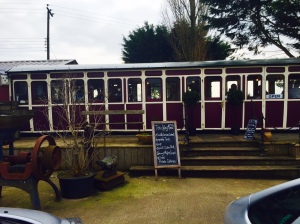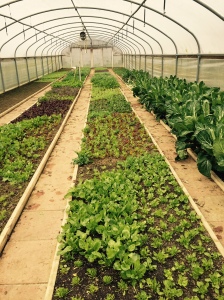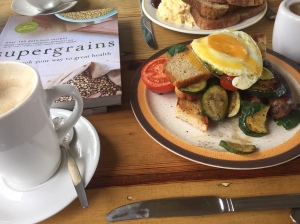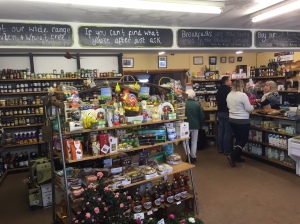Tags
agriculture, Clutch, consumption, dining experience, ethical farming, farm, farm to plate, farmers, farmers market, farming, food hero, food scandal, food sustainability, global meat consumption, Horse meat, land and people, local, local produce, Mother's Day, Organic, organic produce, regional food, roots, seasonal, seasonality, social standards, Somerset, South Somerset, spelt, spelt risotto, sustainable, sustainable farming, the Dairy, The Trading Post, welfare standards, West Country, zero footprint, zero waste
With mothers across the country getting rightfully spoiled for their hard, and sometimes unappreciated work this weekend, I took it upon myself to skip the city, and get back to my family roots out in the West country. Proud of her Somerset heritage, though any traces of a wurzel-esque accent may have faded significantly, our short break out West represented not only a chance for her to catch up with family, but was for me a real insight into the profound connection that food has with the land and people of the area. With many of my mum’s side of the family having worked in agriculture and farming for many years, and a growing interest from myself, and consumers as a whole, in gaining a better understanding of the journey from farm to table; the whole weekend represented an education in the importance that food producers are putting on reconnecting the two.
In the wake of food scandals such as the horse meat saga, the increasing mistrust of big brands is no longer being restrained by a recessionary need to pinch the pennies. Consumers are looking to the food industry to provide transparently wholesome foods that are not only great quality, but hold up against ethical, social and welfare standards. One these producers just so happens to be my Aunt Sue. Her business, the Trading Post, has made a name for itself in the South Somerset area as an ‘Aladdin’s cave for foodies’ and a one stop shop for their own local organic produce, so I was rightfully excited about returning to it. With a real role reversal on the Friday night, as my Mum and Aunt drunkenly terrorised her quiet village, whilst I myself was tucked up in bed up in bed ready for my early morning run, all parties were in need of some Saturday morning sustenance. Having started the shop in 1998, selling their own home grown organic vegetables, the plot has seen significant development, including the addition of the Railway Carriage Café, and thus it only made sense that it should be our first stop.
The charming settings of Sue’s restored 1890 railway carriage was the perfect place to start the day, with some of our fellow passengers having come long distances to sample some of the highly renowned food. With freshly baked loaves perfuming the café, and the veritable mountain of tarts, cakes and savoury muffins greeting you, it’s easy to see why they travel the distance. Scoffing down my eggs with seeded pesto, roasted courgette and olive focaccia, the fantastic food and unique ambience wasn’t the only draw. Overlooking the lush fields, where almost everything on your plate has come from, provides diners with a profound connection to their food. A reassurance to diners that great food is all in the love and attention given to superb ingredients, in the kitchen and in the field. With my Mum opting for a ‘Full Somerset’, everything on her plate was either grown on site or sourced locally, from the mushrooms and tomatoes, to the bread and butter. Immersing you in fully organic eating experience, I helped myself to my Mum’s leftover sausages whilst catching a glimpse through the window of Sue’s pigs chasing each other round the field. Rather disconcertingly for some, Sue later informed me their names were ‘Sausage’ and ‘Bacon’, but I thought they tasted all the better for it. The transparency of not only the open kitchen, but the open fields made it a highly unique eating experience all round.

A rise in the concept of zero food footprint producers, and zero waste restaurant’s in the nation’s capital serves as testament to the increasing awareness of consumers as to the social and environmental impact that unsustainable practices are having. At the Trading Post there was no need for elaborate menu descriptions or edible QR codes with provenance attached, people visit because they could see and understand where the food they were eating came from. Showing me around the poly tunnels, I got to taste powerfully peppery rocket and mustard leaves straight from the ground, and herbs that had unrivalled intensity of flavour compared to anything in a supermarket. Mounds of veg grown metres away greeted every customer entering shop, and sat next to the chef’s own preserves, cakes, and even takeaway meals prepared in the kitchen out back. All of their own produce was complimented with products that you just can’t find in supermarkets, like spelt risotto kits, beetroot and horseradish relish, single origin chocolate and even a few Merchant Gourmet products for good measure.
Living in the city, with a Sainsburys local or Tesco Express on every corner, so often there is a disconnect between what you eat and where it comes from. However, true regional food hero’s like my Aunt Sue, who champion local and organic produce are becoming more widespread, and the British public is finally starting to appreciate the importance of these producers in the UK food industry. With a demand for following strict seasonality in Michelin starred restaurants clear to see, other restaurants in the city like the Dairy in Clapham, which produces many of its ingredients from its rooftop gardens, are taking it one step further. Even lower down the ladder, places like Clutch, Hoxton’s guilt free fried chicken joint, are popularising responsibly produced fast food. Perhaps this is the key then. By providing an avenue to educate shoppers first through deliciously prepared dishes, you can begin to affect long term shopping habits into a far more sustainable model. One that does not rely on mass produced, highly processed or imported food stuffs. It’s easy to see that through places like the Trading Post people are indeed beginning to reconnect with food that has regional heritage, food that helps the local community, and food with a conscience.
Author – Jack Cliffe – Marketing and NPD Assistant



